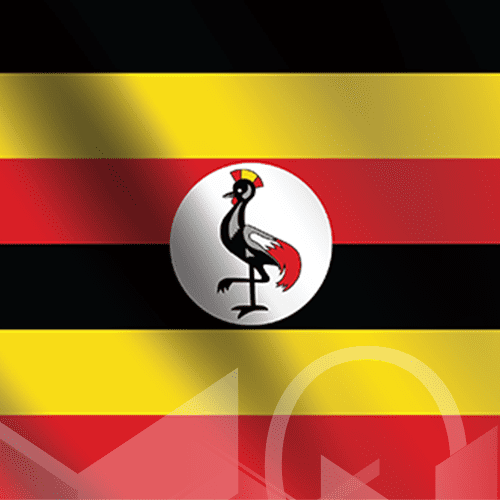
Filter
Sample Reports
Related Links
Uganda
Uganda is a landlocked state in East Africa on Lake Victoria with a land mass of 241,038km² west of Kenya and east of the Democratic Republic of the Congo. It has a population of 47.25 million and GDP grew by 4.3% to US$49.27 in 2023 from US$45.57 in 2022 and is expected to grow to 6.6% in 2026. Its currency is the Ugandan shilling and President Yoweri Museveni has been in power since 1986.
Uganda contains unexploited deposits of bismuth, chromite, cobalt, copper, graphite, lead, lithium, magnesite, nickel, rare earth elements and zinc, while iron ore, phosphate rock, tantalum and niobium minerals, tin (Africa’s fifth largest producer), tungsten (Africa’s fourth largest producer), gold and gemstones are also produced. Recently commercially exploitable reserves of oil and gas have been discovered in Uganda\'s rift valley basins and with progressed preparation of the drilling fields and supportive infrastructure, oil exports are expected to commence by the end of 2025.
While Uganda’s exports surged with increased volumes of production and improvement in terms of trade, resumption of gold trade, and recovery of tourism, imports grew stronger supported by demand from investments into the country’s oil development program, hence weakening the current account.
The Bank of Uganda (BoU), the central bank, tightened monetary policy in March 2024 to curb possible passthrough effects of a fast-depreciating shilling. During the second half of FY24, inflation increased gradually to 3.4% in February 2024 but is forecast to accelerate towards the target of 5%, partly on account of the shilling depreciation recently driven by intensified portfolio outflows and the BoU has raised its policy rate to 10% from the 9.5% maintained since August 2023.
Agriculture accounts for a large share of Uganda’s export earnings and its GDP as well as providing the main source of income for the vast majority of the adult population. Farmers, working an average of less than 3 acres (1 hectare), provide more than half of the agricultural production. They are largely based in the south, where there is more rainfall and fertile soil. Significantly, a considerable number of women own the land on which they work as the Ugandan constitution, alongside a number of laws, articulates a commitment to attain gender equality.
A study by the Ugandan International Bar Association (IBA) into gender disparity in law released in August 2022 revealed that women make up 49% of the profession and occupy 40% of senior roles. The study found that the public sector has the highest percentage of women lawyers overall (57%), as well as the greatest number of female lawyers in a senior role (62%). This is followed by corporations, where 52% of inhouse lawyers and 57% of senior inhouse lawyers are female. Women make up 47% of judges, with 45% holding senior positions.
Uganda has a generous refugee policy and has had an influx of foreigners mainly from the DRC and South Sudan who enjoy access to social services and land, and can move and work freely. However, the continued influx is straining host communities and service delivery.
Since the late 1980s, the state’s macroeconomic policies have consistently focused on containing inflation and ensuring exchange rate stability. President Museveni’s government has made industrial sector development the centre of the state\'s socio-economic development plan. The industrial sector accounts for 18% of GDP and is currently largely dependent on imported inputs like oil and equipment.
Sources: Who Owns Whom sector reports, CIA Factbook, African Development Bank, World Bank, Trading Economics, African Statistical Yearbook and IMF. ?>
Company Profile
There is no data available at the moment
Sector Research
| CompanyName | Stock Exchange | Listed Date | Ticker Code | Country | Status |
|---|---|---|---|---|---|
| AIRTEL UGANDA LTD | Uganda Securities Exchange | 2023-11-07 | Uganda | Active | |
| BANK OF BARODA UGANDA LTD | Uganda Securities Exchange | 0000-00-00 | BOBU | Uganda | Active |
| BRITISH AMERICAN TOBACCO UGANDA LTD | Uganda Securities Exchange | 0000-00-00 | BATU | Uganda | Active |
| CIPLA QUALITY CHEMICAL INDUSTRIES LTD | Uganda Securities Exchange | 2018-07-17 | CiplaQCIL | Uganda | Active |
| DFCU LTD | Uganda Securities Exchange | 2004-10-14 | DFCU | Uganda | Active |
| MTN UGANDA LTD | Uganda Securities Exchange | 2021-12-06 | MTN | Uganda | Active |
| NEW VISION PRINTING AND PUBLISHING COMPANY LTD | Uganda Securities Exchange | 2004-11-00 | NVL | Uganda | Active |
| NIC HOLDINGS LTD | Uganda Securities Exchange | 0000-00-00 | NICO | Uganda | Active |
| STANBIC UGANDA HOLDINGS LTD | Uganda Securities Exchange | 2007-01-25 | SBUL | Uganda | Active |
| UGANDA CLAYS LTD | Uganda Securities Exchange | 0000-00-00 | UGCL | Uganda | Active |
| UMEME LTD | Uganda Securities Exchange | 2012-00-00 | UMEME | Uganda | Active |


